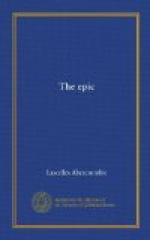This takes us some little way towards deciding the nature of epic. It must be a story, and the story must be told well and greatly; and, whether in the story itself or in the telling of it, significance must be implied. Does that mean that the epic must be allegorical? Many have thought so; even Homer has been accused of constructing allegories. But this is only a crude way of emphasizing the significance of epic; and there is a vast deal of difference between a significant story and an allegorical story. Reality of substance is a thing on which epic poetry must always be able to rely. Not only because Spenser does not tell his stories very well, but even more because their substance (not, of course, their meaning) is deliciously and deliberately unreal, The Faery Queene is outside the strict sense of the word epic. Allegory requires material ingeniously manipulated and fantastic; what is more important, it requires material invented by the poet himself. That is a long way from the solid reality of material which epic requires. Not manipulation, but imaginative transfiguration of material; not invention, but selection of existing material appropriate to his genius, and complete absorption of it into his being; that is how the epic poet works. Allegory is a beautiful way of inculcating and asserting some special significance in life; but epic has a severer task, and a more impressive one. It has not to say, Life in the world ought to mean this or that; it has to show life unmistakably being significant. It does not gloss or interpret the fact of life, but re-creates it and charges the fact itself with the poet’s own sense of ultimate values. This will be less precise than the definite assertions of allegory; but for that reason it will be more deeply felt. The values




